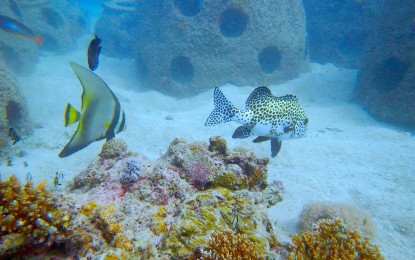
THRIVING MARINE ECOSYSTEM. Various species of fish shown in an undated photo are observed thriving in the Marine Protected Area of Colorada Point in Barangay Tigbao, Aroroy, Masbate. This was believed to be the result of the deployment of reef balls and planting of coral fragments by the mining firm Philippine Gold Processing & Refining Corporation starting in 2017. (Photo courtesy of PGPRC)
LEGAZPI CITY – Various species of fish, some turtles, lobsters, and other sea creatures have been observed thriving in the Marine Protected Area (MPA) of Colorada Point in Barangay Tigbao, Aroroy, Masbate.
This was attributed to the deployment of 2,203 reef balls and the planting of 29,273 coral fragments by the Philippine Gold Processing & Refining Corporation (PGPRC) starting in 2017.
In a statement on Monday, Marione Molintas, spokesperson of Filminera Resources Corp. (FRC) and PGPRC, which is its sister company, said the two firms partnered with the municipal government of Aroroy in undertaking the project to rehabilitate coral reefs that were destroyed due to dynamite fishing and other illegal fishing activities.
"A reef ball is an artificial reef designed to mimic the function of a natural reef. It was developed by US-based Reef Ball Foundation to restore ailing or destroyed coral reefs and create new fishing and scuba diving sites," the statement read.
Molintas noted that reef restoration is critical for the long-term sustainability of the marine ecosystem and the future of local fishermen.
PGPRC hired fisherfolk in the community to become wardens of the MPA and assistants in coral planting and propagation works.
The firm also implemented a goat dispersal project as part of its livelihood support program to the local fishers' organization.
PGPRC is wholly owned by Vancouver-based gold producer B2Gold. (PNA)
